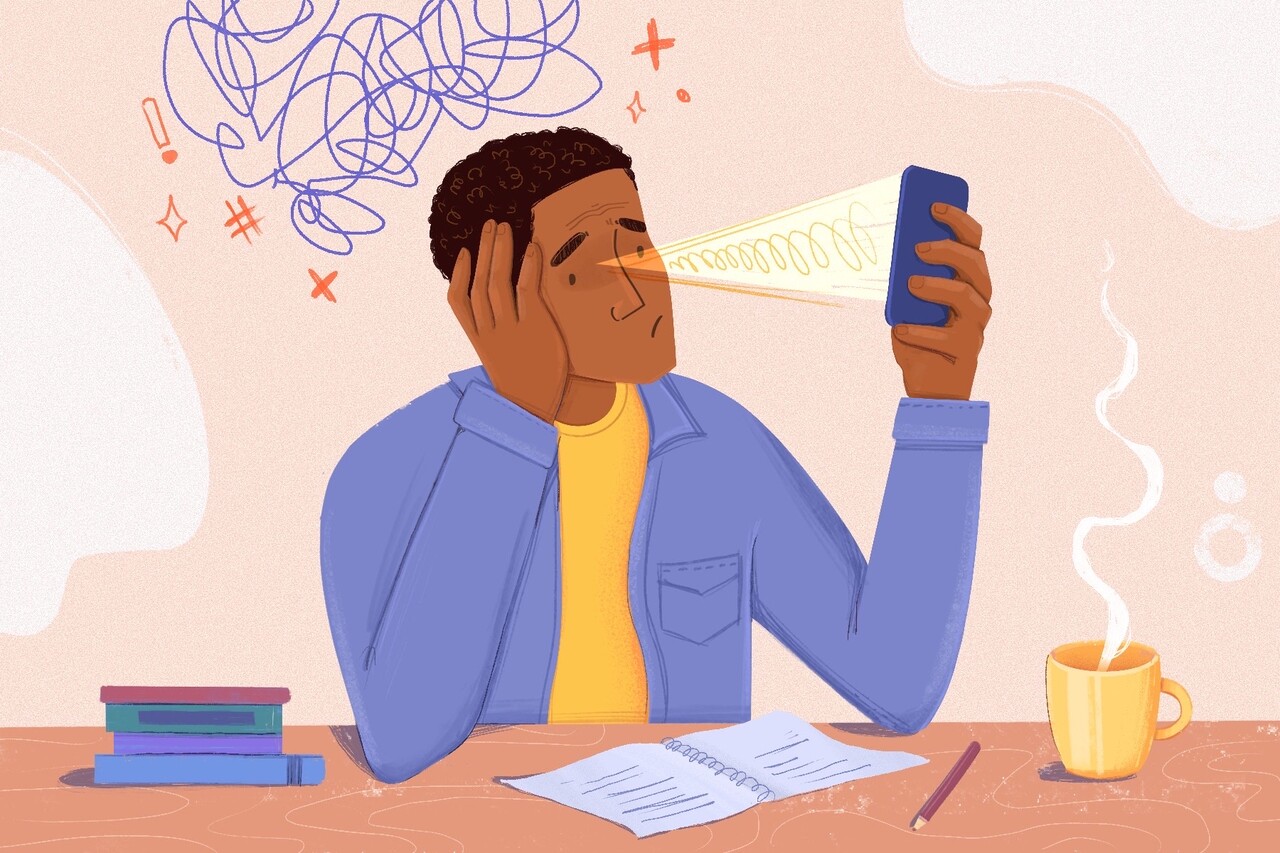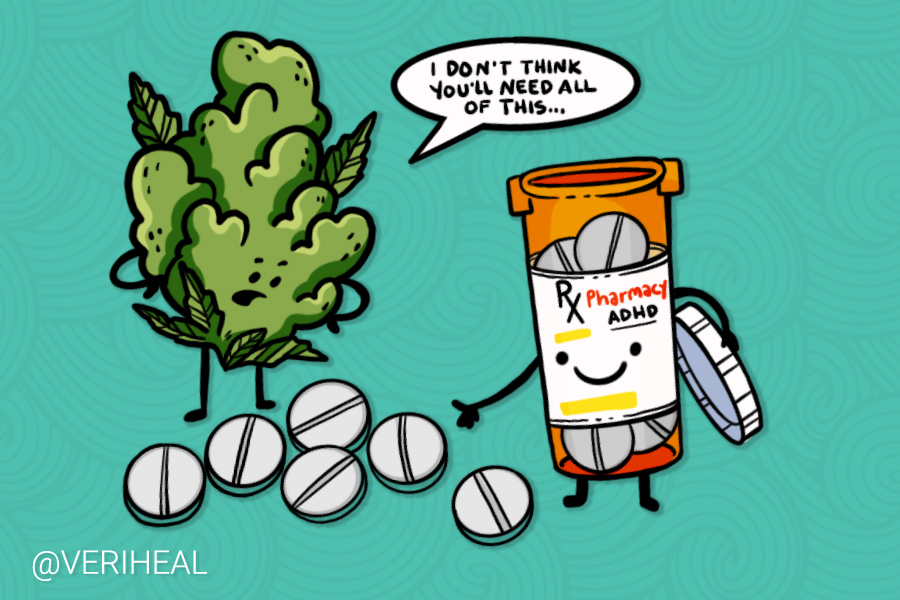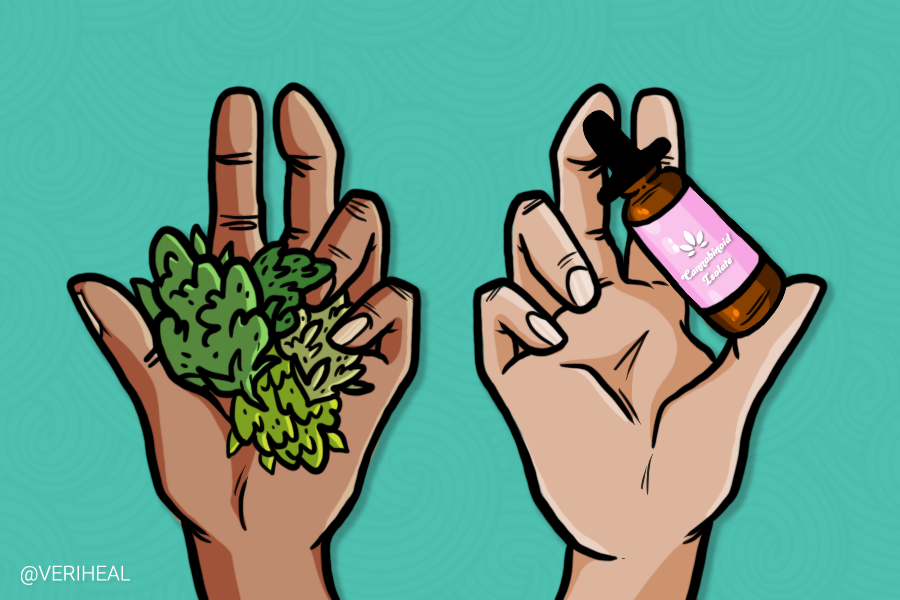Attention-Deficit/Hyperactivity Disorder (ADHD) and Medical Cannabis

- ADHD Causes, Symptoms and Treatments
- The Endocannabinoid System, Medical Cannabis and ADHD
- ADHD and Cannabis: Can Cannabinoids Provide Relief?
- What Preparations of Medical Cannabis are Best for ADHD
- Talk to Your Doctor About Medical Cannabis
When a child or adult has problems staying focused and controlling compulsive behaviors, they likely have attention-deficit/hyperactivity disorder (ADHD). There are several behavioral and medication interventions available, but there is no cure. According to the U.S. Centers for Disease Control and Prevention (CDC), the condition is a “serious public health problem,” very often seen in children.
While there are several types of ADHD medication with Adderall and Ritalin being the two most prescribed, cognitive therapy and appropriate classroom interventions also alleviate ADHD symptoms. The two drugs are actually stimulants that increase dopamine levels and focus have potential long-term abuse risks, making them a concern for thousands of parents who give them to their children daily.
Even more, Insider reports side effects like insomnia, and sudden death to children with heart conditions, suggesting the U.S. Federal Drug Administration (FDA) approved drug may have many more risks than cannabis (11). That is why recent research showing medical cannabis can alleviate some ADHD offers new hope to sufferers of all ages. The positive results are so conclusive that Pennsylvania Family Medicine provider Dr. Elizabeth Sparr prescribes it to her children and patients, noting that her adolescent patients have “seen improved performance in school and happier and calmer kids at home.”
ADHD Causes, Symptoms and Treatments
As suggested by research, the dysfunctional dopamine balance affects the brain, most likely causing ADHD in addition to genetic factors. Five criteria diagnose ADHD under the American Psychiatric Association’s Diagnostic and Statistical Manual, Fifth edition also called the DSM-5. Inattention and hyperactivity are the two main hallmarks of ADHD that include:
- trouble listening and holding attention
- fidgets with hands and feet
- runs and climbs when inappropriate
- talks excessively
- impatience
- impulsivity
- interrupts often, and blurts out answers before questions are asked.
When last surveyed, the CDC reported that 6 million children have ADHD, with boys more likely to have it. As noted, Adderall, a Schedule 2 drug, and Ritalin are concerning drugs, especially for children, because according to the CDC, “medications can affect children differently and can have side effects such as decreased appetite or sleep problems. One child may respond well to one medication, but not to another (1).”
The Endocannabinoid System, Medical Cannabis and ADHD
The endocannabinoid system (ECS) is a complex cell-signaling network found throughout the body and brain that is responsible for regulating key bodily functions including memory, pain perception, and mood among others.
Endocannabinoid signaling modulation offers a promising target for pharmacological interventions, for ADHD and other neuropsychiatric disorders such as PTSD, Tourette syndrome tics, and anxiety in addition to improving synaptic plasticity for emotional learning.
A 2019 case study published in Finland reported on an ADHD patient who found symptomatic relief with the cannabis-based medicines Bedrocan® and Bediol® reported that, “the cannabinoids offering reduced hyperactivity as well as improved focus, impulse control, and better frustration tolerance (5).”
Additionally, the study noted that “The average daily dosage for the patient ranged between 1 and 2 g, usually with a 2: 1 ratio of Bedrocan® to Bediol®. For fast absorption and convenient titration, the cannabinoids were administered via a Volcano vaporizer.” As it turns out, Bedrocan® and Bediol® have actually registered brand names of Cannabis sativa strains called “Afina” and “Elida”, respectively (10). Afina is 22% THC and Elida is nearly 1:1 THC:CBD, they are cannabis flowers from the Bedrocan® company in the Netherlands which claims to be “the only company in the world that can supply standardised medicinal cannabis”. However, the published case study claims no conflict of interest.
Further research is needed to replicate these results. However, the study argues that there is a good amount of supporting evidence that suggests that for ADHD patients who do not find symptom relief from stimulant medication or experience adverse effects, medical cannabis may provide a safe and effective alternative. Particularly when cannabinoids like THC and CBD are combined.
It should be noted that there are several conditions that often occur in conjunction with ADHD that medical cannabis may also help with. “The most common psychiatric comorbidities that co-occur with ADHD in adults are depression, anxiety disorders, bipolar disorder, SUDs and personality disorders (6).”
There is preliminary evidence that medical cannabis may help with these mental health conditions due to its ability to modulate the ECS (7, 9)
The potential of medical cannabis to improve the quality of life and mental health of ADHD patients with comorbid conditions should be investigated further to see if and to what extent cannabis helps relieve symptoms of these disorders.
ADHD and Cannabis: Can Cannabinoids Provide Relief?
Along with improved attendance at school and happier kids at school, Insider reports even more reasons medical cannabis is healthier than FDA-approved drugs.
“As with Adderall and Ritalin, cannabis increases dopamine levels, which can help a person with ADHD to focus,” reports the news source. “But unlike those drugs, medical marijuana is less likely to impair sleep and appetite, and addiction may be less of a risk.”
A 2016 study published in PLOS One, “I Use Weed for My ADHD”: A Qualitative Analysis of Online Forum Discussion on Cannabis Use and ADHD,” affirms what so many are discussing online (8).
Since this qualitative study, there have been several other studies published that investigate the therapeutic potential of medical cannabis to provide symptom relief to ADHD patients, particularly adults with attention-deficit/hyperactivity disorder (3).
A pilot randomized placebo-controlled experimental study of the cannabinoid medication, Sativex Oromucosal Spray, in 30 adults with ADHD was published in 2017 (2). This study found that “adults with ADHD may represent a subgroup of individuals who experience a reduction of symptoms and no cognitive impairments following cannabinoid use.” Although researchers caution that these results are by no means definitive, the study does provide some evidence that supports the anecdotal benefits reported by patients with ADHD who self-medicate with cannabis.
There is limited research available on the recommendation and use of medical cannabis among pediatric ADHD patients. However, one study to watch investigates this very population is “Pharmacokinetics and Perceptions of Children and Young Adults Using Cannabis for Attention-Deficit/Hyperactivity Disorder and Oppositional Defiant Disorder.”
Further research including clinical trials is needed to understand the potential therapeutic benefits of medical cannabis for ADHD patients.
What Preparations of Medical Cannabis are Best for ADHD?
Consuming medical cannabis products that are full-spectrum, meaning they contain all of the phytocannabinoids and terpenes naturally present in the Cannabis sativa L. plant may be beneficial to ADHD patients according to new research.
When medical cannabis products contain the full spectrum of these compounds may produce heightened therapeutic benefits and consequentially limit the adverse effects of cannabis that can be caused by the psychoactive nature of delta-9 tetrahydrocannabinol (THC). This phenomenon is known as “the entourage effect.”
While some still believe that strains (i.e., chemovars) are important to consider when attempting to produce certain effects, emerging research on the entourage effect suggests that cannabinoid and terpene composition is of greater importance. Minor cannabinoids are seldom studied, but may have beneficial effects of their own.
For example, another study titled, “Cannabinoid and Terpenoid Doses are Associated with Adult ADHD Status of Medical Cannabis Patients,” published in 2020 found that “higher-dose consumption of medical cannabis (MC) components (phyto-cannabinoids and terpenes) is associated with ADHD medication reduction. In addition, high dosage of CBN was associated with a lower Adult ADHD Self-Report Scale (ASRS) score (4).” CBN, or cannabinol, is a natural byproduct of THC found in aged cannabis.
Talk to Your Doctor About Medical Cannabis
The legalization of cannabis for medical purposes is on the rise across the country and the globe. Although research remains in its infancy, there are many programs in the United States and abroad that list ADHD as a qualifying condition. With medical cannabis’ potential to improve the quality of life of ADHD patients it is worth discussing this treatment with your doctor.
Talk to a licensed healthcare professional in your state who can recommend medical cannabis to determine if this treatment could be beneficial or a supplemental aspect to your current treatment plan.
Note: The content on this page is for informational purposes only and is not intended to be professional medical advice. Do not attempt to self-diagnose or prescribe treatment based on the information provided. Always consult a physician before making any decision on the treatment of a medical condition.
1. Centers for Disease Control and Prevention. (2022, August 9). Data and statistics about ADHD. Centers for Disease Control and Prevention. Retrieved September 12, 2022, from https://www.cdc.gov/ncbddd/adhd/data.html
2. Cooper, R. E., Williams, E., Seegobin, S., Tye, C., Kuntsi, J., & Asherson, P. (2017). Cannabinoids in attention-deficit/hyperactivity disorder: A randomised-controlled trial. European Neuropsychopharmacology, 27(8), 795–808. https://pubmed.ncbi.nlm.nih.gov/28576350/
3. Goodman, S., Wadsworth, E., Schauer, G., & Hammond, D. (2022). Use and perceptions of cannabidiol products in Canada and in the United States. Cannabis and Cannabinoid Research, 7(3), 355–364. https://www.liebertpub.com/doi/10.1089/can.2020.0093
4. Hergenrather, J. Y., Aviram, J., Vysotski, Y., Campisi-Pinto, S., Lewitus, G. M., & Meiri, D. (2020). Cannabinoid and terpenoid doses are associated with adult ADHD status of medical cannabis patients. Rambam Maimonides Medical Journal, 11(1). https://pubmed.ncbi.nlm.nih.gov/32017685/
5. Hupli, A. M. M. (2018). Medical cannabis for adult attention deficit hyperactivity disorder: Sociological patient case report of cannabinoid therapeutics in Finland. Medical Cannabis and Cannabinoids, 1(2), 112–118. https://www.ncbi.nlm.nih.gov/pmc/articles/PMC8489316/
6. Katzman, M. A., Bilkey, T. S., Chokka, P. R., Fallu, A., & Klassen, L. J. (2017). Adult ADHD and comorbid disorders: Clinical implications of a dimensional approach. BMC Psychiatry, 17(1). https://www.ncbi.nlm.nih.gov/pmc/articles/PMC5567978/#:~:text=The%20most%20common%20psychiatric%20comorbidities,disorders%20are%20summarized%20in%20Fig
7. Martin, E. L., Strickland, J. C., Schlienz, N. J., Munson, J., Jackson, H., Bonn-Miller, M. O., & Vandrey, R. (2021). Antidepressant and anxiolytic effects of medicinal cannabis use in an observational trial. Frontiers in Psychiatry, 12. https://pubmed.ncbi.nlm.nih.gov/34566726/
8. Mitchell, J. T., Sweitzer, M. M., Tunno, A. M., Kollins, S. H., & McClernon, F. J. (2016). “I use WEED FOR MY ADHD”: A qualitative analysis of online forum discussions on cannabis use and ADHD. PLOS ONE, 11(5). https://www.ncbi.nlm.nih.gov/pmc/articles/PMC4882033/
9. Schier, A., Ribeiro, N., Coutinho, D., Machado, S., Arias-Carrion, O., Crippa, J., Zuardi, A., Nardi, A., & Silva, A. (2014). Antidepressant-like and anxiolytic-like effects of Cannabidiol: A chemical compound of Cannabis Sativa. CNS & Neurological Disorders – Drug Targets, 13(6), 953–960. https://pubmed.ncbi.nlm.nih.gov/24923339/
10. Starrenburg, F. (2022, August 1). Cannabis products by Bedrocan. Bedrocan. Retrieved September 12, 2022, from https://bedrocan.com/cannabis-products/
11. Thompson, S. (2020, January 10). Some parents are turning to medical marijuana to treat ADHD instead of adderall. Insider. Retrieved September 12, 2022, from https://www.insider.com/adhd-marijuana-adderall-alternative-kids-2020-1

















